Getachew Yilma Debela, Gurmel Ghataora, Michael Burrow
Department of Civil Engineering, School of Engineering, University of Birmingham, UK
Correspondence to: Getachew Yilma Debela, Department of Civil Engineering, School of Engineering, University of Birmingham, UK.
| Email: |  |
Copyright © 2019 The Author(s). Published by Scientific & Academic Publishing.
This work is licensed under the Creative Commons Attribution International License (CC BY).
http://creativecommons.org/licenses/by/4.0/

Abstract
The government of Ethiopia has given significant attention to the road sector considering its immense impact on the socio-economic development of the country as road transport reaches the majority of the people. In this respect, the Ethiopian Roads Authority (ERA) is mainly responsible for the construction and maintenance of federal road networks of the country. The road maintenance and construction practice of ERA is predominantly based on the conventional method of quantity and unit rate based by which several works are planned and carried out. The government has faced problems in maintaining the serviceability of road infrastructure systems by using these traditional methods of contracting. However, in recent years other alternative contracting methods are attempted including output and performance based road contracting (OPRC) in the Ethiopian road sector. These types of procurement methods have a substantial success records in many developed and developing countries. Nonetheless, taking the long term nature of the contract into account, OPRC projects require careful planning and capacity from the contracting authority and the contractor to implement it successfully. Hence, this study assessed the problems and prospects of a pilot OPRC project in Ethiopia based on interview of professionals involved in the project. The contractors and the client have been facing many problems in the implementation of the OPRC project and it may be concluded that the project may not be successful unless corrective measures can be taken by both parties to negate the defaults committed by the parties in the contract. Moreover, strong international and local private companies are required to implement such projects successfully otherwise there will be serious challenges to develop future PPP road projects in Ethiopia.
Keywords:
Ethiopia, Output and Performance Based Road Contracting, Contractor, Consultant, Client
Cite this paper: Getachew Yilma Debela, Gurmel Ghataora, Michael Burrow, A Case Study on the Problems and Prospects of Output and Performance Based Road Contracting (OPRC) in Ethiopia, International Journal of Construction Engineering and Management , Vol. 8 No. 1, 2019, pp. 7-18. doi: 10.5923/j.ijcem.20190801.02.
1. Introduction
Agriculture is the most crucial economic sector of Ethiopia. It contributes around 33% of the GDP and it accommodates 70% of the workforce of the country (Iimi et al., 2017). Transport infrastructures play a significant role in the social, economic and political enhancement of a country by facilitating easy transport systems. Ethiopia has one of the most successful airlines in Africa providing local and international transport services for passengers and freight, but local air transport service represents only a small fraction of the total transport demand due to unaffordable airfare and area of coverage (Worku, 2011). The country has one railway line connecting Addis Ababa to Djibouti extending for 759km mainly used for import and export of goods. Road transport in Ethiopia reaches the majority of the population in the country and it has a high impact on the economic and social progress due to better accessibility. Ethiopia has a road network composed of 113,066 km of roads covering 1.23 km per 1000 population scattering throughout the country as indicated in Table 1 (ERA, 2016).Table 1. Classified Road Networks in Ethiopia
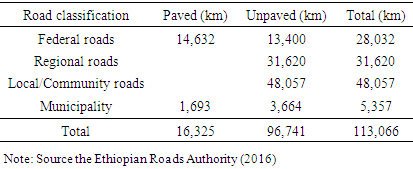 |
| |
|
The Ethiopian Roads Authority (ERA) is responsible for the construction and maintenance of federal road networks of the country. In this regard, the government of Ethiopia has attached a high priority in improving the road infrastructure since the inauguration of the Road Sector Development Programs (RSDP) in 1997. Consequently, four phases of RSDP were implemented over the period of 1997 to 2015 and the fifth phase; RSDP V, has been implemented since July 2015. The total budget for this period was equivalent to ETB 232.5 billion (USD 15.9 billion) but the amount disbursed in the same period was ETB 266.2 billion (USD 17.4 billion). In this effort, the country’s road network has increased from 26,550 km in 1997 to 113,066 km in 2016 (ERA, 2016).The maintenance and construction practice of road in ERA is predominantly based on conventional method of quantity and unit rate based where several activities are planned and executed. In this traditional method of contracting, the client (ERA) demands the contractor what work is to be done and the extent of the work. The contractor is paid on the basis of quantity accomplished according to the contract rates. ERA is responsible to supervise the construction and maintenance works executed by the contractors by its Engineers and assigned consultants. In an effort to look other methods of delivery, ERA contracted out major road improvement and maintenance works to international contractors with the support of the World Bank in 2016 through output and performance based road contract (OPRC) and it is under implementation. Since OPRC is a long-term contract, before the introduction of it for road infrastructure development in a country, it requires massive planning and a cultural change among the road authority (Sultana et al., 2012). Therfore, this study will assess the problems and prospects of a pilot output and performance based road contract (OPRC) in Ethiopia.
2. Literature Review
2.1. Introduction
Output and performance based road contracting (OPRC) is an agreement between a government and a private contractor whereby the private contractor maintains the road to achieve specified standards for a certain period of time in return for a fixed payment for meeting specified performance indicators. These indicators include riding quality, strength of the road, safety features, and roadside conditions management (Mulmi, 2016). On the other hand, in traditional road maintenance contracts, the contractor is responsible for the execution of works which are normally defined by the Employer, and the contractor is paid on the basis of unit prices for different work items (Radović et al., 2014).Output and performance based contracting has been implemented by many road agencies around the world with the intention of improving the effectiveness and efficiency of road maintenance practices. The development of performance based contracts for road maintenance started in the late 1980’s and early 1990’s by British Columbia in Canada when it contracted out its road maintenance in 1988 (Zietlow, 2007). Two years later, Argentina contracted out almost half of its national roads using performance based for maintenance works and services including periodic maintenance and spot rehabilitations, with a penalty system for failures to meet response times for rectifying deficiencies (ADB, 2018).During the 1990s, many countries in Latin America such as Brazil, Chile, Peru, and Uruguay started their first performance based contracts (PBC) pilot projects (Zietlow, 2007). At the same time, PBC developed in Australia and New Zealand, Denmark, Estonia, Finland, and the United States of America (Zietlow, 2007). Many other countries followed in implementing performance based contracts after the year 2000 (ADB, 2018).The term output and performance based road contracting (OPRC) is mainly used by the World Bank (ADB, 2018). However, different terminologies are utilized in many countries including: Asset Management Contracts in USA, Performance Specified Maintenance Contracts in Australia and New Zealand (PSMC), Performance–based Road Maintenance Contracts (PBRMC), Contract for Rehabilitation and Maintenance in Argentina and other Latin American countries, Managing Agent Contracts (MAC) in the UK, and Area Maintenance Contracts in Finland (Sultana et al., 2012). For the purpose of this study, we use the World Bank terminology of output and performance based road contracting (OPRC).Developed countries switched from conventional contracting out to performance based contract mainly due to the potential for cost savings while for developing countries, the main driving force to introduce performance based contract is to secure sufficient long-term financing for road maintenance and guarantee better road conditions (ADB, 2018). Other reasons for adopting of performance based contract include reduce the strain of management, initiate a Public Private Partnership (PPP), have private sector interest, allow to bundle multiple contracts into a single contract, ease to fulfil the compliance requirements, and regulate inspections (Shrestha & Powers, 2018). Furthermore, according to Zietlow (2007), there are some other reasons for implementing OPRC projects including:• to reduce maintenance costs through the application of more effective and efficient technologies and work procedures; • to provide transparency for road users, road administrations and contractors with regard to road maintenance; • to improve control and enforcement of quality standards; and • to improve overall road conditions.
2.2. Advantages of Output and Performance Based Road Contract (OPRC)
The main advantages of performance based road contract are: savings of cost for road maintenance works, enable risk sharing and assure quality of construction by the contractor, encourage introduction of innovation. This type of contract also helps to increase the efficiency of both the road authority and the contractor, reduce the administrative burden of the road authority, improve user satisfaction, help to achieve a sustainable road management system, increase the flexibility of work and enhance transparency. The later helps to reduce corruption (Sultana et al., 2012). Another important advantage of OPRC project is that the users know exactly the road conditions they can expect and demand (Zietlow, 2004). By paying contractors based on the level of service they deliver, OPRC projects provide a clear financial incentive for contractors to meet performance standards (Bull et al., 2014).OPRC projects also give advantages to the government and the private sector contractor in many ways. In this respect, OPRC projects are usually longer than traditional contracts, which incentivize private contractors to take measures that improve the road conditions for the duration of the contract rather than unplanned repairs and also commit governments to fund maintenance for several years which ultimately result in reduction of long term costs from lower rehabilitation and reconstruction costs (Bull et al., 2014). As illustrated in Figure 1, in the traditional way of managing road construction and maintenance the asset condition significantly deteriorates before the intervention for reconstruction demanding huge additional cost to retain the design life of the road. On the other hand, through performance based road contracting, the condition of the road can be retained to the level of the service requirement by the contractor without adverse deterioration up to the end of performance life of the road.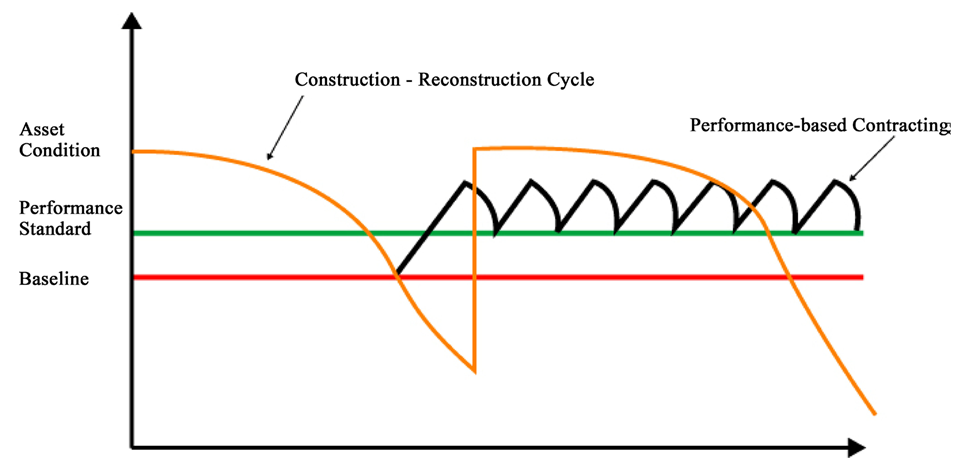 | Figure 1. Asset condition under the traditional and performance based contracting (Mulmi, 2016) |
Nevertheless, before embarking on performance contracts, it is necessary to analyse legal and financial feasibility of the project (Zietlow, 2007). Several other factors need to be considered when designing performance based contracts in order to achieve value for money and efficiencies over traditional contracts including affordability, incentive structure, risk allocation, contract scope and length of the road as described in Figure 2 (Bull et al., 2014). | Figure 2. Factors for consideration of OPRC project alternative (Bull et al., 2014) |
For developing countries there are some peculiar issues which need special attention before the implementation of a performance based contract. These issues are: political influence, corruption, securing the source of long term funding, and estimating the cost of project (Sultana et al., 2012). In addition to that in designing performance contracting each performance contract has to be tailored to each specific situation. It should be long enough to include at least one periodic maintenance application in order to maximize the potential benefits. Well experienced contractors and consultants are significant to the success of performance contracts. Proper performance monitoring and strict application of penalties for noncompliance have proven to be critical to the success. Zietlow (2004) also suggest that performance indicators need to be developed further to avoid ambiguity in contract prescriptions and to make them measure objectively.Moreover, successful implementation of OPRC can serve as an introduction to public private partnerships (PPPs) road projects from the change of role of the public sector from a purchaser of goods or inputs to a purchaser of services. This shift of role of the public sector requires different capacities and implementing output based contracts is one way for governments to build experience in PPPs (Bull et al., 2014). These types of contracts can therefore be a starting point for governments interested in PPPs and can help governments build a track record of monitoring PPP contracts. Since performance contracts are new for road agencies and contractors in many developing countries, close cooperation between both parties is vital for success otherwise; improper implementation of this scheme could backfire and produce adverse effects (Zietlow, 2007).According to Sultana et al. (2012), there are many challenges in introducing performance based road contract in developing countries. The challenges are including:• Support from the government,• Dependency on external funding,• Political influence and corruption,• Lack of experience and knowledge on OPRC,• Lack of planning,• Challenges in estimating the cost,• Fear of losing job,• Performance and attitude of contractors,• Monitoring the cost savings,• Loss of competition, and• Loss of control of the network.
2.3. Scope of Work in Performance Based Road Contract
The conventional way of contracting out road maintenance is based on the amount of work being measured and paid for on agreed rates for different work items (Zietlow, 2007). The performance based contracts require a different contractual relationship between client and contractor where all works and services are paid for based on a performance audit, which can be conducted by the client or an external consultant or both (ADB, 2018). Performance based contracts are essentially management contracts and traditional road construction or maintenance contractors often do not have the required qualifications necessary for this type of contract (Zietlow, 2004). In developing countries, where road conditions may have deteriorated to such an extent that major rehabilitation works are required to bring the roads up to maintainable conditions, major rehabilitation works are often part of the scope of contract (ADB, 2018). Performance based contracts have clearly specified objectives which are expressed in terms of level of service or key performance indicators. Performance levels are minimum conditions of road, bridge, road side, and traffic assets that must be met by the contractor over the entire contract period and they may also cover other services such as the collection and management of asset inventory data, attendance to emergencies, and response to public requests, complaints, and feedback. Performance levels are usually grouped into management performance levels and operational performance levels (ADB, 2018).§ Management performance levels which reflect the ability of the contractor to successfully manage the contract outputs, including the provision of timely reporting information to the client regarding contractor’s works program, quality assurance system, health and safety management plans, environmental management plan, emergency procedures and contingency plan, traffic management plan, inventory database management, inspections, management information system, and§ Operational performance levels which concerns about pavement condition, road marking and pavement markers, drainage system, road signs, vegetation control, incident response, road patrol, routine maintenance of bridges and structures, roadside telephone and emergency services, operation of weather stations. Operational performance levels need to satisfy three main objectives (ADB, 2018):ü to satisfy road users with respect to accessibility, comfort, travel speed and safety;ü to minimize total long term cost to the road organization and road users; andü to minimize environmental impacts
2.4. Background to OPRC in Ethiopia
It is reported that due to under-maintenance of road infrastructure in Ethiopia, the government is exposed to additional capital spending of USD263 million per year (Foster & Morella, 2010). This is manly happened because of early failure of roads because of lack of maintenance and the deficiency in enforcement of the conventional outsourcing method of maintenance works based on quantity of works and unit rates. Under the traditional road maintenance contracts, the contractor is responsible for the execution of works which are normally defined by the contracting authority or the Employer, and the contractor is paid on the basis of unit prices for different work items. On the other hand, Output and Performance-based Road Contracting (OPRC) is designed to increase the efficiency and effectiveness of road asset management and maintenance to ensure that the physical condition of the roads under contract is adequate for the need of road users, over the entire period of the contract (Radović et al., 2014). The Ethiopian Roads Authority (ERA) attempted to outsource the improvement and maintenance works through output and performance based road contract (OPRC) to state owned enterprises (SOE) in 2016. Accordingly, ERA launched a restricted tender for the maintenance of the following road projects.Table 2. List of OPRC Projects Launched for Restricted Tender
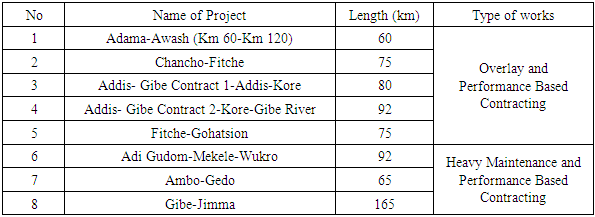 |
| |
|
As the concept of OPRC was new to ERA and the road sector, the contract was drafted so as to share the risk by the SoE contractors and ERA. To this end, the periodic maintenance of the asphalt overlay works to bring the road into a pre-defined level of service was planned to be paid on a unit rate basis on a completed section of the road meeting the required level of service as defined in the specification. The management and maintenance service was designed to be paid on a fixed periodic remuneration rate after the periodic maintenance works was completed and accepted by ERA. With the above understanding, ERA had shortlisted and invited the following four state owned contractors to submit their bids for the specific projects the contractors were interested.Table 3. List of Invited SOE Applicants for the Bidding of OPRC Projects
 |
| |
|
However, only three state owned enterprises were awarded OPRC road projects through the above bidding process which are currently under implementation as shown in Table 4. The main reason for only three of the projects were awarded successfully was due to high cost offer by the bidders for the remaining projects.Table 4. Projects Awarded to SOE through OPRC
 |
| |
|
In the meantime, with the support of the World Bank, ERA contracted out a major OPRC project, Nekempte - Bure Road Project, to international contractors through competitive bidding in 2016. The study mainly focused on the problems and prospects of this OPRC project to draw lessons for future similar projects.
2.5. Description of Nekemete - Bure OPRC Project
The Ethiopian Roads Authority (ERA) with the financial support of the World Bank has contracted out to three contractors to implement the design, improvement and management and maintenance service works of Nekemete - Bure road upgrading project under an output and performance based road contract (OPRC). The project is divided in to three contracts undertaken by three independent contractors and consultants with the following details shown in table 5.Table 5. Project Data of Nekemete – Bure OPRC project
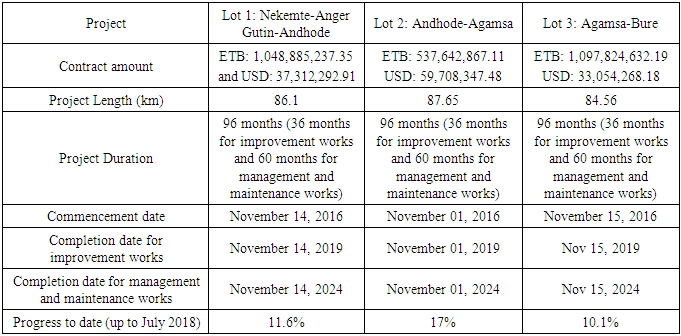 |
| |
|
The project area is located between the two heavily populated regions, Oromia and Amhara, in western part of Ethiopia. The road connects two of the major trunk roads in the Country. One runs from Addis Ababa to Bahir Dar, Gondar and finally to Sudan in the northwest and the other runs from Addis Ababa to Nekemte, Gimbi, and finally to Assosa in the west. The existing gravel road runs for 258.56 Km between the two towns (Nekemte and Bure). Nevertheless, due to increased traffic and rapid need for expansion of road connectivity, it is in need of major upgrading to asphalt road so that it can also be integrated with the road from Nekemte to Bedele. The road crosses the Blue Nile River around 200km from Nekemte town. It crosses various agro-ecological zones as it traverses major valley. The contractors of each contract are expected to execute the following major activities:§ Design work§ Improvement works§ Management and maintenance services § Emergency worksThe contract duration is eight (8) years. For the purpose of setting the time for completion of the annual construction periods for the improvement works and maintenance services, the entire contract duration (period) is divided in to eight (8) separable portions as shown in Table 6.Table 6. Project Contract Duration
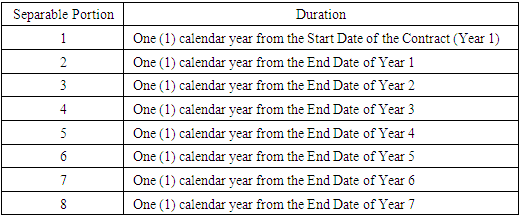 |
| |
|
3. Research Methodology
There are two types of research strategies, namely, ‘quantitative research’ and ‘qualitative research’. The main criteria to decide on which type of research to follow is depend on the type of study and availability of the information which is required for the study (Naoum, 2013). The research was started with a literature review of output and performance based road contracting (OPRC) to identify the advantages of this delivery system in lieu of conventional method of contracting. By addressing those advantages, the study investigated the problems and the prospects of OPRC projects in Ethiopia through a structured interview of professionals involved in the pilot OPRC project. The sample of the interview respondents were selected based on expert sampling method from the target population of the client (ERA), contractors and consultants working in the OPRC projects to get reliable information. The advantage of this approach is that since experts tend to be more familiar with the subject matter their opinions are more credible than a sample that includes both experts and non-experts (Bhattacherjee, 2012).Following a qualitative approach, the analysis of the interview and literature review drew requirements for the implementation of OPRC projects and it also highlighted the common obstacles and prospects for its development. Quantitative data analysis yield quantified results and conclusions derived from evaluation of the results in the light of the theory and literature (Fellows & Liu, 2008). According to Naoum (2013), qualitative research emphasizes meanings, experiences and descriptions to subjectively evaluate the opinion, view or perception of respondents towards a particular issue. Hence, a combination of content analysis of the transcripts of the interviews and descriptive statistics was used in the data analysis.
4. Analysis of the Interview
4.1. Introduction
An interview was designed and conducted with professionals working in the OPRC project in June 2018. The interviews were administered mainly with highly experienced top and mid-level management of the contractors and consultants who participated in the project together with the client.
4.2. Background of Respondents to the Interview
The interview was carried out among selected target professionals involved in the OPRC project. The respondents were selected based on the following criteria:• Professional background;• Experience of work;• Educational level and;• Position of the person in the project.Out of the total 10 interview participants, 4(40%) were from the client side, 3(30%) from the consultant side and 3(30%) were from the contractor side as demonstrated in Figure 3.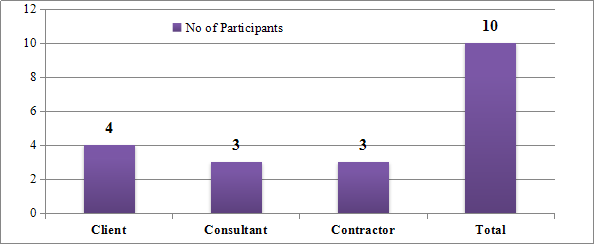 | Figure 3. Origin of Interview Participants |
Out of the ten participants of the interview 70% of them hold Msc degree and only 30% were holding bachelor degree as shown in Table 7.Table 7. Background of Interview Participants
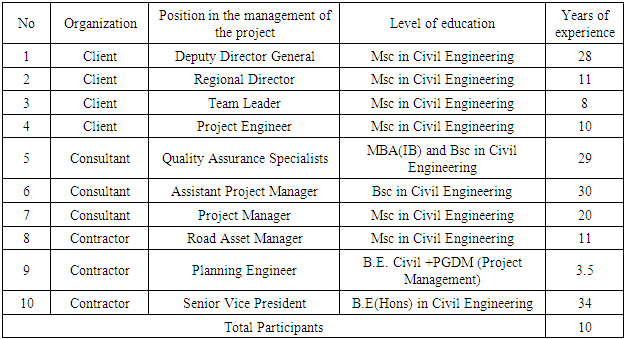 |
| |
|
The respondents who participated in the interview have been involved in the road sector for many years, extending from a minimum of 3.5 years to a maximum of 34 years, with a mean period of 18.5 years. Out of the total participants of the interview 40% of them have above 20 years of experience in the road sector. 10% of the total interviewees have experience 16 to 20 years, 20% have experience 11 to 15 years, 20% have experience of 5 to 10 years and 10% of the interviewees have experience less than 5 years respectively as shown in Figure 4. Thus, the interview data provided regarding the problems and prospects of the OPRC case study are considered reasonably reliable. | Figure 4. Experience of Interview Participants in the Road Sector |
4.3. Analysis of the Interview Responses
4.3.1. Introduction
The questions of the interviews were prepared based on the literature review and the case study of the pilot OPRC project. The interview was semi-structured but it gave opportunities to the participants to express their comments which may be beneficial for the study.The interview contained questions on the background of the interviewee, experience of the professionals working with traditional methods of contracting, the appropriateness of the selected project for OPRC model, the main difficulties faced by the public agency and the contractor in the implementation of the OPRC project, the experiences gained from the OPRC project for future similar projects and factors that may affect the prospects of future PPP road projects in Ethiopia.
4.3.2. Problems of Traditional Methods of Road Project Procurement in Ethiopia (such as DB, DBB)
Participants in the interview commented that traditional method of road contracting in Ethiopia is affected by several factors in terms of cost, quality, time and inappropriate risk allocation to any of the parties in the contract.All the interviewees witnessed that cost and time overrun is a common phenomenon in these conventional procurement methods in the Ethiopian road sector. Participants also commented that this is mainly emanated from inappropriate scope definition and level of detail in the procurement documents due to design deficiencies. According to the interviewees, project preparation for design and build and design-bid-build is not usually adequate and the capacity of the public agency in administering design works is not sufficient to counteract in poor design submissions by consultants which further affect the design quality resulting in cost and time overrun. In relation to the above, interviewees commented that the time allocated for undertaking the design was not adequate, usually one and half years. This limited the level of detail of the design. This issue originates from the terms of reference of design procurement that makes the design quality questionable since it does not involve detail foundation and subgrade investigation. Unforeseen ground conditions, in terms of both foundation and sub grade soils (including earth works), have a very significant impact on cost of the project.The interview participants further indicated that since there is not an established streamlined project delivery selection method in the Ethiopian road sector, without appropriate study decisions sometimes are given in a single meeting to procure through a design and build or design bid build method for political reasons. There is also a significant gap between design completion and project implementation which often requires for design review to execute the projects according to the participants.Furthermore, the participants of the interview indicated the following experiences in the execution of traditional procurement methods in the Ethiopian road sector:• Risk allocation is not appropriate to the client and value for money is not confirmed in the case of design and build projects.• Client’s misunderstanding in risk allocation and tendency to transfer all risks to the contractors is a critical problem in design and build projects.• Quality optimizations is always there in design and build projects due to the freedom of the contractor to design the works as far as it meets the minimum employer’s requirement which may not achieve value for money for the client.• Lack of maintenance is a major problem in the traditional procurement method after the project becomes operational.• In the case of design –bid – build project, most of the risks are allocated to the client and the quality is not assured.• The design standards are not specified based on the context of Ethiopia.• In the traditional methods, there is a frequent loss of benchmarks and surveying monuments which makes difficult to put the design on the ground resulting in variations, claims and disputes.• Selecting a committed and capable contractor is very challenging and it should be ensured at the early procurement stage for successful implementation.
4.3.3. Suitability of Nekempte – Bure Road Project to Implement Using the Output and Performance Based Road Contract (OPRC) Model
According to majority of the participants, the Nekempte - Bure is appropriate for OPRC since it has adequate current and projected traffic and it is a major link road to connect the two highly populated regions (Oromia and Ahmara) of the country with resource endowed areas. However, the interviewees commented that the proportion of the improvement work and the maintenance works in terms of cost is not appropriate since it consists of 70% improvement works and 30% maintenance cost. This increases the risk for the client as the contractor may not consider the maintenance and management works attractive to continue for five years after the completion of the improvement works.Some of the participants indicated that the pilot project for OPRC should have been tested with management and maintenance works only and due to the scope of the improvement works the public agency is compelled to administer the project as a design and build project due to fear of quality concern at a later stage. To the contrary, other interviewees commented that the maintenance and management works of the project was very challenging due to high intensity of rainfall along the project route which increases the deterioration rate and transferring this risk through OPRC is the correct decision. To this end, some participants from the client indicated that the improvement works are attractive to the contractor as the management and maintenance works only could not attractive the private sector due to the level and scope of the works.
4.3.4. The Main Difficulties the Ethiopian Roads Authority has been Facing in the Implementation of the OPRC Project
According to the interviewees, the main difficulties that the road authority is facing during the implementation of the OPRC project are delay and lack of coordination of public agencies (telecommunication, electric and water lines) in the removal of the right of way, lack of community support, political influence by the local administration, indecision of the client on important issues, lack of capacity of the road authority in managing the OPRC project, security problem, poor performance of the contractors and unwillingness of doing the work as per the schedule by the contractors. Moreover, the participants commented that the client has been facing the following difficulties in the implementation of the OPRC project:• The contractors are not showing any partnership with the client and committed to execute the work.• The contract for environmental and social management by the contractor focuses on deduction for noncompliance rather it would have been better if it had been drafted to give incentive to the contractor for compliance.• The top management of the Ethiopian Roads Authority has misunderstood the project nature (focusing on output) and it has been attempting to manage it as a traditional contract (focusing on input) which has complicated the execution of the project.The government has not put a strong political support to the project and a lot of difficulties were encountered due to security and in land acquisition processes.• Due to lack of experience of the client in preparation of bid document for OPRC projects, many issues were noted later at the implementation stage in the contract documents which affected the success of the project.• Due to lack of capacity from the client side and limited efforts to enhance capacity of the public sector before and after the implementation of the OPRC, the project is affected due to poor contract management.• Poor management of the contractors due to under mobilization of qualified manpower and construction equipment to the project.• Right of way problem should have been resolved before the contract was concluded and sectional penalties should not be included in the contract.
4.3.5. The Main Problems the Contractors have been Facing during the Implementation of the Output and Performance Based Road Contract (OPRC)
The participants of the interview survey indicated that the contractors of the OPRC project have been facing different problems including security problem, contract documents ambiguity, cash flow problem, interruption of works by the local community, delays in handover of the site to the contractor from the client and stringent environmental and social management requirement.In addition to the above, the interviewees commented that the following difficulties were noted with the contractors:• The contractors have serious resource mobilization problem specially construction equipment (mobilized out-dated construction equipment) and it mainly relied on rental equipment and subcontracting of the improvement works.• Due to lack of coordination and management problem from the main contractors, the project is not progressing well as per the schedule.• Due to misunderstanding of the subcontractors, there is frequent demand for payment inconsistent with the main contract (payment is effected every five kilometres up to maximum of fifteen kilometres reaching up to sub base level).• The contractors are not capable to execute the project and they should have been screened out at the procurement stage.• The contractors are not financially sound to finance the project until certain time before the project can generate money from the client according to the payment modality in the contract.• The contractors are mainly using sub-contractors for the improvement works and they have been only managing the maintenance works by their own resources. However, the contractors are not coordinating and supervising the subcontractors works to ensure the quality of the works with well-organized quality control system.• The contractors are using mainly rental equipment for the execution of the works. This has led to lack of suitable plant being mobilized as the contract demands since the owners of the equipment are not willing to relocate their equipment regularly. This has been affecting the contractor’s progress.• The contractors’ Road Mangers were not active in engaging with the local community to get community support.
4.3.6. The prospects of Public Private Partnerships Road Projects in Ethiopia
The participants of the interview commented that the implementation of the pilot OPRC project will assist the adoption of future similar road projects in Ethiopia since it can help to measure the client’s maturity in management of such projects, financing of projects from local sources could be understood, experience for local companies in subcontracting of such projects can be learnt and foreign contractors can study the local capacity in contracting out.In addition to the above, the interviewees indicated that the OPRC project will help in selecting the right project for OPRC, defining scope of works, and preparation of well drafted bidding documents specifying the right performance standards with clear service level requirement and enhancing monitoring capacity of service level by public agency.Furthermore, the participants commented that as a pilot project, lessons are drawn from the difficulties encountered in the implementation of the OPRC project by the public agency, contractors and consultants for future similar projects.Experts in the interview emphasised that lack of government support can be a possible hindrance to implement long term PPP road project in Ethiopia. The participants have commented that since the commencement of the OPRC project there was not high government official visit to the project to give security assurance to the contractors except the implementing agency. Interviewees also indicated that political support in the implementation of PPP road project is critically important for its success and the private sector trust needs to be won over by the government to attract their financing for PPP road projects in Ethiopia.Participants of the interview further indicated that stability and predictability of political, economic and social factors need to be ensured to attract the private sector to involve in long term contracts. Interviewees further commented that Regional government support for such big projects should be confirmed at early stage and make accountable the regional authorities for any contribution for project failure.Some participants stated that the factors that affected the execution of the projects and indicated as barriers for implementation of future PPP road project in Ethiopia were as follows:• Performance standards and database on traffic volume of the country need to be developed for the country to give sufficient information to the private sector for proper risk assessment.• For successful implementation of PPP, government should implement local capacity building programs.• It is important to avoid setting the performance standard in subjective terms which can be open for interpretations and hence for disputes. Assessment standards must be specified objectively to measure service level requirements.• Government failure to give sufficient compensation to local people for their land for borrow pits and quarry sites has impacted the progress project and the local people have developed negative impression (lack of community support). In this regard, consultation with the local community in the process of the project development should be finalized before setting up any contract.According to the participants of the interview, the prospective of PPP road projects in Ethiopia will be very bright if the lessons learnt in the implementation of the OPRC project is properly documented and disseminated to stakeholders and can be taken into account for future works. However, the interviewees commented that cautious selection and preparation of feasible projects, foundation works to enhance the capacity of implementing agencies and local contractors and the awareness of the public at large must be undertaken to realize PPP road projects in Ethiopia. Moreover, the participants indicated that strong international and local private companies are required to implement it successfully otherwise there will be serious challenges in implementing PPP.
5. Conclusions and Recommendations
5.1. Conclusions
This research evaluated the problems and prospects of the pilot OPRC project under implementation and future PPP road projects. From the analysis of the interview, the following conclusions can be summarised to offer insights to increase the chance of successful adoption of PPP road projects in Ethiopia.• Though introduction of OPRC was an appropriate decision to the road sector to curb the common phenomenon of cost overrun, time overrun and quality, the right pilot project was not selected to develop capacity in the country. In this respect, road projects with maintenance and management works only could have been suitable to introduce the concepts of OPRC projects in Ethiopia.• The main difficulties that the road authority is facing during the implementation of the OPRC project are delay and lack of coordination of public agencies (telecommunication, electric and water lines) in the removal of obstructions, lack of community support, political influence by the local administration, indecision of the client on important issues, lack of capacity of the road authority in managing the OPRC project, security problem, poor performance of contractors and unwillingness of doing the work as per the schedule by the contractors.• The contractors of the OPRC project have been facing a range of problems including security problem, contract documents ambiguity, lack of capacity, cash flow problem, interruption of works by the local community, delays in handover of the site by the client and strict environmental and social management requirements.• Lack of government support can be a possible hindrance to implement long term PPPs for road projects in Ethiopia. Political commitment to support the implementation of PPP for road projects is critically important to win the private sector trust to invest in infrastructure in Ethiopia.• Stability and predictability of political, economic and social factors need to be ensured to attract the private sector to involve in OPRC projects. It is also important to ensure the executing agencies readiness to implement long term private sector infrastructure investment before embarking PPP road projects in Ethiopia.
5.2. Recommendations
• The OPRC project may not be successful unless corrective measures could be taken by both parties to negate the defaults committed by the parties in the contract. Separate OPRC contract management team under the responsible Regional Directorate should be established which will regularly monitor the OPRC contracts. To equip the team with adequate skills, proper capacity building program in the form of extensive training among all stakeholders including contractors and supervision consultants need to be organized by ERA.• The risk allocation in the contract is not favourable to the contractors specially the payment modality. Relaxation of the payment modality through rigorous negotiation between the parties should be exercised to increase the success rate of the project including the modification of the contract period.• The capacity of the client should be enhanced at all levels to understand the nature of the contract and to administer the OPRC project properly. It is imperative that the government embarks on an aggressive capacity building programme to improve the capacity of the staff in the Authority. This shall enable the government to prepare better bidding documents for future OPRC projects, understand the risk management structure required to formulate a fair and enforceable contract. It is acknowledged that the government could engage private companies with adequate experience to perform some of these functions; however, it is important that the government should have the capacity to confirm the services of the consultants and to maintain the sustainability of the procurement method.• The Ethiopian Roads Authority should evaluate the pilot OPRC project contract documents to rectify the ambiguities noted for future procurement of similar projects.• From the perspective of the contractors, it is essential that they perform due diligence on the performance of the OPRC project in line with the objectives of the project and they need to have the capability to discharge the responsibilities allocated to them in the contract.
6. Limitations of the Research
The research has some limitations since it has been based on only interview of professionals involved in one pilot OPRC project consisting three contracts. The results would have been more rigorousness if more case studies could have been conducted. The low number of interview participants may affect the scope of the research output.
ACKNOWLEDGEMENTS
This paper forms part of a research titled “Assessment of Government Policies and Regulation in the Process of Adopting Public Private Partnership Road Projects in Ethiopia”. In the preparation of this study many have contributed invaluable support. Sincere thanks go to the experts at the Ethiopian Roads Authority for their willingness to provide us with all necessary data so that the research work could be carried out. We are also indebted to those industrial professionals from the public sector, private sector and development partners who kindly participated in the interview.
References
| [1] | ADB, 2018. Guide to Performance-Based Road Maintenance Contracts. Manila, Philippines: Asian Development Bank. |
| [2] | Bhattacherjee, A., 2012. Social Science Research: Principles, Methods, and Practices. Textbooks Collection. 3. Second Edition Copyright © 2012 by Anol Bhattacherjee. |
| [3] | Bull, M., Brekelmans, R. & Wilson, L., 2014. Lessons Learned in Output and Performance-Based Road Maintenance Contracts. PPIAF-Enabling Infrastructure Investment. |
| [4] | ERA, 2016. Road Sector Development Program 19 Years Performance Assessment. Addis Ababa: Ethiopian Roads Authority. |
| [5] | Fellows, R. & Liu, A., 2008. Research Methods for Construction Third Edition. John Wiley & Sons Ltd, The Atrium, Southern Gate, Chichester, West Sussex, PO19 8SQ, Ltd, The Atrium, Southern Gate, Chichester, West Sussex, PO19 8SQ, Ltd, The Atrium, Southern Gate, Chichester, West Sussex, PO19 8SQ, UK. |
| [6] | Iimi, A., Adamtei, H., James, M. & Tsehaye, 2017. Port Rail Connectivity and Agricultural Production Evidence from a Large Sample of Farmers in Ethiopia. Policy Research Working Paper. World bank Group. |
| [7] | Mulmi, D., 2016. Assessment of Performance Based Road Maintenance Practices in Nepal. Open Journal of Civil Engineering, 6, pp.225-41. |
| [8] | Naoum, S., 2013. Dissertation Research & Writing for Construction Students Third Edition. Oxford, UK: Butterworth-Heinemann. |
| [9] | Radović, N., Mirković, K., Šešlija, M. & Peško, I., 2014. Output and Performance Based Road Maintenance Contracting – Case Study Serbia. Tehnički vjesnik , 21(3), pp. 681-688. |
| [10] | Shrestha, & Powers, 2018. Performance-Based Contracting for Maintaining Rest Area Stops. In 54th ASC Annual International Conference Proceedings, by Asssociated of School of Constrcution., 2018. |
| [11] | Sultana, Rahman, A. & Chowdhury, S., 2012. An Overview of Issues to Consider Before Introducing Performance-Based Road Maintenance Contracting. World Academy of Science, Engineering and Technology 62. |
| [12] | Worku, I., 2011. Road Sector Development and Economic Growth in Ethiopia. EDRI Working Paper 4. Addis Ababa, Ethiopia: Ethiopian Development Research Insitute. |
| [13] | Zietlow, 2004. Implementing Performance-based Road Management and Maintenance Contracts in Developing Countries - An Instrument of German Technical Cooperation. German Development Cooperation (GTZ). |
| [14] | Zietlow, G., 2007. Cutting Costs and Improving Quality through Performance-Based Road Management and Maintenance Contracts - The Latin American and OECD Experiences. Birmingham (UK): University of Birmingham (UK) Senior Road Executives Programme Restructuring Road Management Birmingham. |







 Abstract
Abstract Reference
Reference Full-Text PDF
Full-Text PDF Full-text HTML
Full-text HTML





